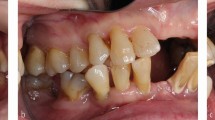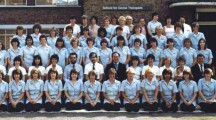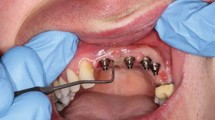Key Points
-
This paper outlines the history and development of dental therapy within the UK.
-
It describes the recent expansion in the number of dental therapy training places and details of dental therapy schools.
-
It explores the clinical remit of dental therapists, the expanded range of clinical settings in which they currently work and their future importance in providing added value to the dental team.
Abstract
The number of students entering training for dental therapy has been increasing rapidly over the last few years. In practice, the scope of their work has increased, both in terms of permitted duties and their range of clinical settings. The possibilities for dental practitioners to work with therapists is therefore increasing, so it is important for them to be clear about therapists' potential capacity to provide added value to the dental team. This paper, which is the first of four covering aspects of dental therapy in the UK, traces the history of dental therapy together with the development of therapists' training opportunities and emerging competencies, up to the present. The subsequent three papers will describe aspects of a survey of dental therapists undertaken in late 2006.
Similar content being viewed by others
Log in or create a free account to read this content
Gain free access to this article, as well as selected content from this journal and more on nature.com
or
References
General Dental Council. Principles of dental team working. London: GDC, 2006.
Gelbier S. 125 years of developments in dentistry, 1880–2005. Part 6: general and specialist practice. Br Dent J 2005; 199: 685–688.
Woolgrove J, Boyles J. Operating dental auxiliaries in the United Kingdom - a review. Community Dent Health 1984; 1: 93–99.
Welshman J. Dental health as a neglected issue in medical history: the school dental service in England and Wales, 1900–40. Med Hist 1998; 42: 306–327.
The Nuffield Institute. The education and training of personnel auxiliary to dentistry. London: The Nuffield Institute, 1993.
Royal Commission on the National Health Service, London. 1979.
The Nuffield Institute. An inquiry into dental education. A report to the Nuffield Foundation. London: The Nuffield Institute, 1980.
Dental Strategy Review Group. Towards better dental health: guidelines for the future. London: Department of Health, 1981.
Dental Auxiliary Review Group. Professions complementary to dentistry. London: GDC, 1998.
General Dental Council. Developing the dental team. Curricula frameworks for registerable qualifications for professionals complementary to dentistry (PCDs). London: GDC, 2004.
Ross M K, Ibbetson R J, Turner S. The acceptability of dually-qualified dental hygienist-therapists to general dental practitioners in South-East Scotland. Br Dent J 2007; 202: E8.
General Dental Council. Scope of practice consultation webpage. http://www.gdc-uk.org/News+publications+and+events/Consultations/Closed+consultations/Scope+of+Practice+Consultation.htm (accessed 24 September 2009).
Department of Health. Modernising NHS dentistry; implementing the NHS plan. London: Department of Health, 2000.
Goodwin N, Morris A J M, Hill K B et al. National evaluation of personal dental services (PDS) pilots: main findings and policy implications. Br Dent J 2003; 195: 640–643.
Ward P. The changing skill mix - experiences on the introduction of the dental therapist into general dental practice. Br Dent J 2006; 200: 193–197.
Harris R, Burnside G. The role of dental therapists working in four personal dental service pilots: type of patients seen, work undertaken and cost-effectiveness within the context of the dental practice. Br Dent J 2004; 197: 491–496.
Gallagher J L, Wright D A. General dental practitioners' knowledge of and attitude towards the employment of dental therapists in general practice. Br Dent J 2003; 194: 37–41.
National Health Service. The National Health Service (General Dental Services Contracts) Regulations. London: HMSO, 2005.
Harris R V, Haycox A. The role of team dentistry in improving access to dental care in the UK. Br Dent J 2001; 190: 353–356.
Woolgrove J, Harris R. Attitudes of dentists towards delegation. Br Dent J 1982; 153: 339–340.
Hay I S, Batchelor P A. The future role of dental therapists in the UK: a survey of district dental officers and general dental practitioners in England and Wales. Br Dent J 1993; 175: 61–65.
Douglass C W, Lipscomb J. Expanded function dental auxiliaries: potential for the supply of dental services in a national dental program. J Dent Educ 1979; 43: 556–567.
Jones G, Devalia R, Hunter L. Attitudes of general dental practitioners in Wales towards employing dental hygienist-therapists. Br Dent J 2007; 203: E19.
Seward M. PCD - what's in a name? Br Dent J 1999; 187: 1.
General Dental Council. Scope of practice. London: GDC, 2009.
Acknowledgements
This study was funded by the NHS R&D Primary Dental Care Programme.
Author information
Authors and Affiliations
Corresponding author
Additional information
Refereed paper
Rights and permissions
About this article
Cite this article
Rowbotham, J., Godson, J., Williams, S. et al. Dental therapy in the United Kingdom: part 1. Developments in therapists' training and role. Br Dent J 207, 355–359 (2009). https://doi.org/10.1038/sj.bdj.2009.900
Accepted:
Published:
Issue date:
DOI: https://doi.org/10.1038/sj.bdj.2009.900
This article is cited by
-
What are the possible barriers and benefits to the use of dental therapists within the UK Military Dental Service?
BDJ Team (2022)
-
What are the possible barriers and benefits to the use of dental therapists within the UK Military Dental Service?
British Dental Journal (2022)
-
How dental hygienists got off to a flying start
BDJ Team (2018)
-
Dental skill mix: a cross-sectional analysis of delegation practices between dental and dental hygiene-therapy students involved in team training in the South of England
Human Resources for Health (2014)
-
The policy context for skill mix in the National Health Service in the United Kingdom
British Dental Journal (2011)



